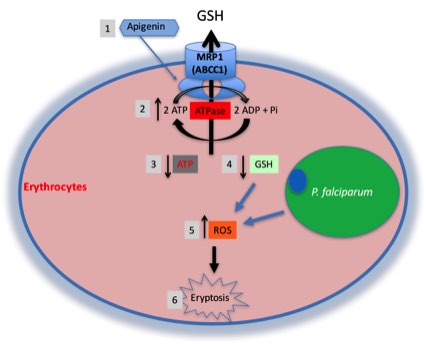Novel Anti-malarials
Observation - As an intracellular parasite, malaria infects healthy erythrocytes throughout its asexual life cycle. Infected erythrocytes experience a heightened levels of reactive oxygen species (ROS) at early trophozoite stage of its asexual life cycle. This heightened ROS is normally mitigated by normal high levels of glutathione (GSH) in erythrocytes, in addition to parasite exported GSH.
Our hypothesis - Based on our work of Collateral Sensitivity in tumour cells, whereby activation of ABCC1 with verapamil or apigenin leads to active efflux of GSH from tumour cells, we hypothesized that stimulation of erythrocyte's ABCC1 activity would cause a reduction in GSH levels in malaria infected erythrocytes. This in turn would lead to heightened ROS and eryptosis (or erythrocyte apoptosis). Indeed, oxidative stress-induced eryptosis has been demonstrated in several genetic traits of erythrocytes that include, sickle-cell, beta-thalassemia, and glucose-6-phosphate dehydrogenase (G6PD) deficiency. The combined effects of oxidative stress from the genetic traits and malaria infection of erythrocytes is thought to be responsible for the pre-mature erythrocyte cell death and consequent termination of parasite growth.
Our novel approach to deplete erythrocyte's GSH levels through stimulation of ABCC1, mimics erythrocyte's genetic traits state that can lead to eryptosis when combined with malaria infection, but not in non-infected erythrocytes (Figure 1). Indeed, we have recently demonstrated our proof of principle whereby the addition of apigenin to un-infected erythrocytes led to heightened ROS and a significant decrease GSH. Moreover, the addition of apigenin to an in-vitro culture of P. falciparum alone inhibited the proliferation of chloroquine-sensitive and -resistant parasites. Furthermore, apigenin synergized with artemisinin when combined.
Figure 1

Our Experimental Approaches
ABC-Mediated Collateral Sensitivity
Apigenin-induced ABCC1-mediated efflux of glutathione from mature erythrocytes inhibits the proliferation of Plasmodium falciparum. Fallatah O, Georges E. Int J Antimicrob Agents. 2017 Nov;50(5):673-677.